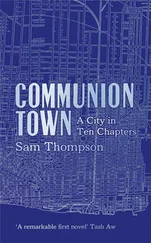Frank Tallis - Deadly Communion
Здесь есть возможность читать онлайн «Frank Tallis - Deadly Communion» весь текст электронной книги совершенно бесплатно (целиком полную версию без сокращений). В некоторых случаях можно слушать аудио, скачать через торрент в формате fb2 и присутствует краткое содержание. Жанр: Исторический детектив, на английском языке. Описание произведения, (предисловие) а так же отзывы посетителей доступны на портале библиотеки ЛибКат.
- Название:Deadly Communion
- Автор:
- Жанр:
- Год:неизвестен
- ISBN:нет данных
- Рейтинг книги:3 / 5. Голосов: 1
-
Избранное:Добавить в избранное
- Отзывы:
-
Ваша оценка:
- 60
- 1
- 2
- 3
- 4
- 5
Deadly Communion: краткое содержание, описание и аннотация
Предлагаем к чтению аннотацию, описание, краткое содержание или предисловие (зависит от того, что написал сам автор книги «Deadly Communion»). Если вы не нашли необходимую информацию о книге — напишите в комментариях, мы постараемся отыскать её.
Deadly Communion — читать онлайн бесплатно полную книгу (весь текст) целиком
Ниже представлен текст книги, разбитый по страницам. Система сохранения места последней прочитанной страницы, позволяет с удобством читать онлайн бесплатно книгу «Deadly Communion», без необходимости каждый раз заново искать на чём Вы остановились. Поставьте закладку, и сможете в любой момент перейти на страницу, на которой закончили чтение.
Интервал:
Закладка:
Frank Tallis
Deadly Communion
Part One
1
Liebermann was seated on a wooden chair at the head of the rest bed. He had adopted an attitude which he found conducive to listening: legs crossed, his right fist against his cheek, the tip of his index finger resting gently on his temple. His supine patient — Herr Norbert Erstweiler — could not see the young doctor. In fact, Herr Erstweiler could see very little apart from the white ceiling and, if he dropped his gaze, a plain door in which a panel of opaque glass had been mounted. Herr Erstweiler’s eyes were restless. Their agitated movements suggested unease, apprehension. It was as if — Liebermann thought — Herr Erstweiler was worried that someone might intrude.
‘I am not expecting anybody,’ said Liebermann.
‘I beg your pardon?’
‘We shan’t be interrupted. No one will come in.’
‘Good … I wouldn’t want that.’
‘You were saying that your sleep is disturbed.’
‘That’s right. I can’t get to sleep any more. I get into bed, extinguish the lamp, and I am immediately overcome by terror. It’s the darkness … something about the darkness.’
‘Something in the darkness?’
‘No, I wouldn’t say that. I would say it was the quality of the darkness itself … its emptiness. I haven’t been eating, either. My appetite has completely gone and my stools are loose.’
Liebermann noticed that Herr Erstweiler’s hands were trembling slightly.
‘Do you have difficulty breathing, Herr Erstweiler?’
‘Yes — my chest feels tight … and my heart, I can feel it pounding all the time. There’s something wrong with it. I know there is.’
Liebermann consulted the notes on his lap.
‘No, Herr Erstweiler. There is nothing wrong with your heart.’
‘I’m not sure the cardiologist I saw conducted a thorough examination.’
‘Professor Schulde is an expert.’
Erstweiler glanced at the door.
‘Well, that may be so … but even experts are wrong sometimes.’
Liebermann scrutinised his patient: early thirties, dark hair infiltrated with grey, a thin, drawn face, tired, bloodshot eyes, finger marks on his spectacles. Erstweiler’s brow was scored by three lines: short, long and short. Their depth suggested indelibility. He had neglected his toilet and his chin was scabrous.
Erstweiler placed a palliative hand over his frantic heart.
The young doctor realised that discussing symptoms was making Erstweiler more anxious. He decided to distract him by adopting a different line of inquiry.
‘I understand that you have only recently arrived in Vienna,’ said Liebermann.
‘Yes. I settled here just before Christmas.’
‘Where are you from?’
‘Tulln — do you know it, Herr doctor?’
Erstweiler’s voice was hopeful.
‘I know of it,’ said Liebermann. ‘Were you born there?’
‘No, Eggenburg — but my family moved to Tulln when I was very young. Just a quiet provincial town,’ said Erstweiler, ‘but I’m a simple fellow and easily satisfied. Walking, fishing … a little rowing in the summer.’ Erstweiler blinked and a faint smile softened his features. ‘I was very happy in Tulln.’
‘Why did you leave?’
‘I was made redundant when my employer died. I was personal secretary to one of the councillors — Councillor Meternich — and worked in the Town Hall. It wasn’t a very demanding situation — some correspondence, diary keeping, that sort of thing. Meternich died in the autumn of last year. His illness was quite protracted. He knew …’ Erstweiler hesitated and stuttered. ‘He knew he was g-going to d-die …’ It was obvious to Liebermann that the poor man was struggling to overcome some private horror. Erstweiler took a deep breath and continued: ‘… And he wrote to a friend — recommending me for a clerical post. He was a kindly old man — Meternich — and knew that I would have difficulty finding alternative employment in Tulln. Meternich’s friend was Herr Winkler, a businessman who imports furniture and objets d’art from Japan. I now work at his warehouse in Simmering. The job doesn’t pay very well, but I’ve been told I could be promoted shortly.’
Lieberman made some notes and asked: ‘Do you live on your own?’
‘Yes … no. What I mean is … I have taken a room — lodgings — in the house of a Czech gentleman and his wife.’
‘In Simmering?’
‘A short distance from Winkler’s warehouse.’
‘Do you have any family or friends in Vienna?’
‘No.’
‘What about back in Tulln? Did you leave anyone behind?’
‘Both of my parents are deceased. I have an older brother … but we haven’t spoken in years. He went to live in Salzburg. He’s a railway official, of high rank. He wears a uniform like a general! We were never very close. He considers me …’ Erstweiler grimaced, ‘unambitious.’
Liebermann tapped his index finger against his temple, then wrote down the words anxiety neurosis and anxiety hysteria. But he was not satisfied with his putative diagnoses. Once again, he observed his patient glancing towards the door and added in parentheses: dementia paranoides? Liebermann decided to raise the subject of symptoms again.
‘When did you first become unwell, Herr Erstweiler?’
‘About a week ago. It came on quite suddenly.’
‘Have you ever suffered from similar episodes in the past? Difficulty in breathing? Accelerated heart rate?’
‘No, never. I’ve always been very healthy.’
‘Then has anything happened to upset you?’
Erstweiler did not answer.
Liebermann persevered: ‘Have you received any bad news? Witnessed an accident? Ended a relationship?’
‘No … nothing like that.’
‘But something has happened …’
Erstweiler closed his eyes. The mere thought of disclosure made him want to shut out the world.
‘What do you think is the matter?’ asked Liebermann softly. ‘What do you suppose these symptoms mean?’
The patient opened his eyes again. They were glassy, unfocused, and the tone of his voice was nuanced correspondingly: ‘They mean I am going to die.’
‘But there really is nothing wrong with you, Herr Erstweiler. All the investigations and tests have demonstrated that you are in perfect health. Now.’ Liebermann tapped his pen on the chair arm to capture the man’s attention. ‘There can be no doubt that you are currently troubled by anxiety — hyperventilation, tachycardia, insomnia, and loss of appetite — but these symptoms are relatively benign.’
Erstweiler ignored Liebermann’s plea.
‘My fate is sealed,’ he whispered. ‘I am going to die. And there is nothing that you or any of your colleagues can do to save me. When death knocks on the door, you cannot deny him.’
Liebermann made another note.
‘Herr Erstweiler?’
The patient seemed to rouse from his abstracted state. His eyes engaged with the material world again — the ceiling, the door.
‘Yes?’
‘Something happened to you.’ Liebermann modulated his voice to counter the directness of his request. ‘It is important that you tell me everything, if I am to help you.’
‘I should never have agreed to this hospital admission. It was my general practitioner’s idea — Vitzhum. He persuaded me … persuaded me that I was suffering from nerves and that I’d see things differently after a few weeks’ rest. I was eager to believe him — of course — given the alternative. At the time I thought he was right, I thought I might be going mad — but I’m not. Oh, if only I were! Dear God! If you declared me insane today — and could prove it — I would be greatly relieved.’
Читать дальшеИнтервал:
Закладка:
Похожие книги на «Deadly Communion»
Представляем Вашему вниманию похожие книги на «Deadly Communion» списком для выбора. Мы отобрали схожую по названию и смыслу литературу в надежде предоставить читателям больше вариантов отыскать новые, интересные, ещё непрочитанные произведения.
Обсуждение, отзывы о книге «Deadly Communion» и просто собственные мнения читателей. Оставьте ваши комментарии, напишите, что Вы думаете о произведении, его смысле или главных героях. Укажите что конкретно понравилось, а что нет, и почему Вы так считаете.












